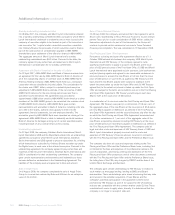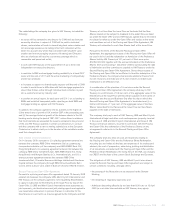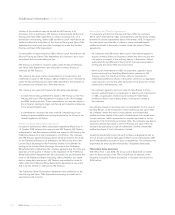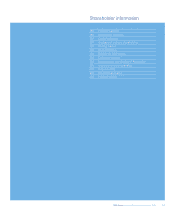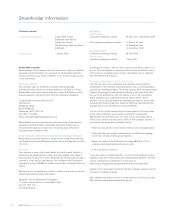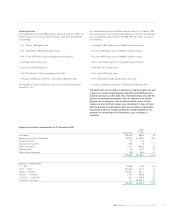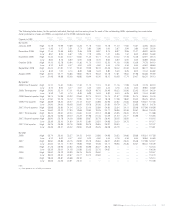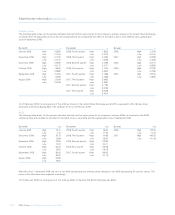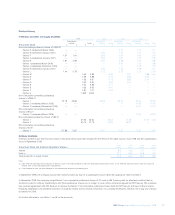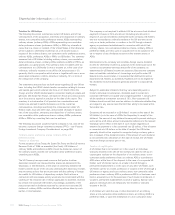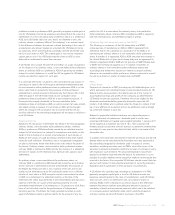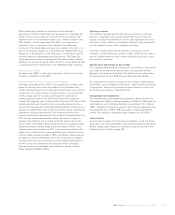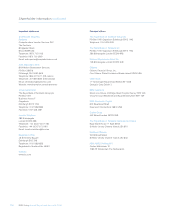RBS 2008 Annual Report Download - page 293
Download and view the complete annual report
Please find page 293 of the 2008 RBS annual report below. You can navigate through the pages in the report by either clicking on the pages listed below, or by using the keyword search tool below to find specific information within the annual report.
RBS Group Annual Report and Accounts 2008292
Shareholder information continued
Taxation for US Holders
The following discussion summarises certain US federal and UK tax
consequences of the acquisition, ownership and disposition of ordinary
shares, non-cumulative dollar preference shares, ADSs representing
ordinary shares (ordinary ADSs), ADSs representing non-cumulative
dollar preference shares (preference ADSs) or PROs by a beneficial
owner that is a citizen or resident of the United States or that otherwise
will be subject to US federal income tax on a net income basis in
respect of the ordinary shares, non-cumulative dollar preference shares,
ordinary ADSs, preference ADSs or PROs (a US Holder). This summary
assumes that a US Holder is holding ordinary shares, non-cumulative
dollar preference shares, ordinary ADSs, preference ADSs or PROs, as
applicable, as capital assets. This summary does not address the tax
consequences to a US Holder (i) that is resident (or, in the case of an
individual, ordinarily resident) in the UK for UK tax purposes or (ii)
generally, that is a corporation which alone or together with one or more
associated companies, controls, directly or indirectly, 10% or more of
the voting stock of the company.
The statements and practices set forth below regarding US and UK tax
laws, including the US/UK double taxation convention relating to income
and capital gains which entered into force on 31 March 2003 (the
Treaty), and the US/UK double taxation convention relating to estate and
gift taxes (the Estate Tax Treaty), are based on those laws and practices
as in force and as applied in practice on the date of this report. This
summary is not exhaustive of all possible tax considerations and
holders are advised to satisfy themselves as to the overall tax
consequences, including specifically the consequences under US
federal, state, local and other laws, and possible changes in taxation
law, of the acquisition, ownership and disposition of ordinary shares,
non-cumulative dollar preference shares, ordinary ADSs, preference
ADSs or PROs by consulting their own tax advisers.
The following discussion assumes that the company is not, and will not
become, a passive foreign investment company (PFIC) – see ‘Passive
Foreign Investment Company Considerations’ on page 295.
Ordinary shares, preference shares, ordinary ADSs and
preference ADSs
Taxation of dividends
For the purposes of the Treaty, the Estate Tax Treaty and the US Internal
Revenue Code of 1986, as amended (the Code), US Holders of
ordinary ADSs and preference ADSs should be treated as owners of
the ordinary shares and the non-cumulative dollar preference shares
underlying such ADSs.
The US Treasury has expressed concerns that parties to whom
depositary receipts are released before shares are delivered to the
depositary, or intermediaries, in the chain of ownership between US
holders and the issuer of the security underlying the depositary receipts
may be taking actions that are inconsistent with the claiming of foreign
tax credits for US holders of depositary receipts. Such actions in
connection with pre-release activity would also be inconsistent with the
claiming of the reduced rate of US tax applicable to dividends received
by certain non-corporate US holders. Accordingly, availability of the
reduced tax rate for dividends received by certain non-corporate US
holders of ordinary ADSs could be affected by actions taken by such
parties or intermediaries.
The company is not required to withhold UK tax at source from dividend
payments it makes or from any amount (including any amounts in
respect of accrued dividends) distributed by the company. US Holders
who are not resident or ordinarily resident in the UK and who do not
carry on a trade, profession or vocation in the UK through a branch,
agency or permanent establishment in connection with which their
ordinary shares, non-cumulative preference shares, ordinary ADSs or
preference ADSs are held, used or acquired will not be subject to UK
tax in respect of any dividends received on the relevant shares or
ADSs.
Distributions by the company will constitute foreign source dividend
income for US federal income tax purposes to the extent paid out of the
current or accumulated earnings and profits of the company, as
determined for US federal income tax purposes. Because the company
does not maintain calculations of its earnings and profits under US
federal income tax principles, it is expected that distributions will be
reported to US Holders as dividends. Payments will not be eligible for
the dividends-received deduction generally allowed to corporate US
holders.
Subject to applicable limitations that may vary depending upon a
holder’s individual circumstances, dividends paid to certain non-
corporate US Holders in taxable years beginning before 1 January 2011
will be taxable at a maximum tax rate of 15%. Non-corporate US
Holders should consult their own tax advisers to determine whether they
are subject to any special rules that limit their ability to be taxed at this
favourable rate.
Dividends will be included in a US Holder’s income on the date of the
US Holder’s (or in the case of ADSs, the Depositary’s) receipt of the
dividend. The amount of any dividend income paid in pounds sterling or
euros will be a US dollar amount calculated by reference to the relevant
exchange rate in effect on the date of such receipt regardless of
whether the payment is in fact converted into US dollars. If the dividend
is converted into US dollars on the date of receipt, the US Holder
generally should not be required to recognise foreign currency gain or
loss in respect of the dividend income. If the amount of such dividend
is not converted into US dollars on the date of receipt, the US Holder
may have foreign currency gain or loss.
Taxation of capital gains
A US Holder that is not resident (or, in the case of an individual,
ordinarily resident) in the UK will not normally be liable for UK tax on
capital gains realised on the disposition of an ordinary share, a non-
cumulative dollar preference share, an ordinary ADS or a preference
ADS unless at the time of the disposal, in the case of a corporate US
Holder, such US Holder carries on a trade in the UK through a
permanent establishment or, in the case of any other US Holder, such
US Holder carries on a trade, profession or vocation in the UK through a
UK branch or agency and such ordinary share, non-cumulative dollar
preference share, ordinary ADS or preference ADS is or has been used,
held or acquired by or for the purposes of such trade (or profession or
vocation), permanent establishment, branch or agency. Special rules
apply to individuals who are temporarily not resident or ordinarily
resident in the UK.
A US Holder will, upon the sale or other disposition of an ordinary
share, a non-cumulative dollar preference share, an ordinary ADS or a
preference ADS, or upon the redemption of a non-cumulative dollar


